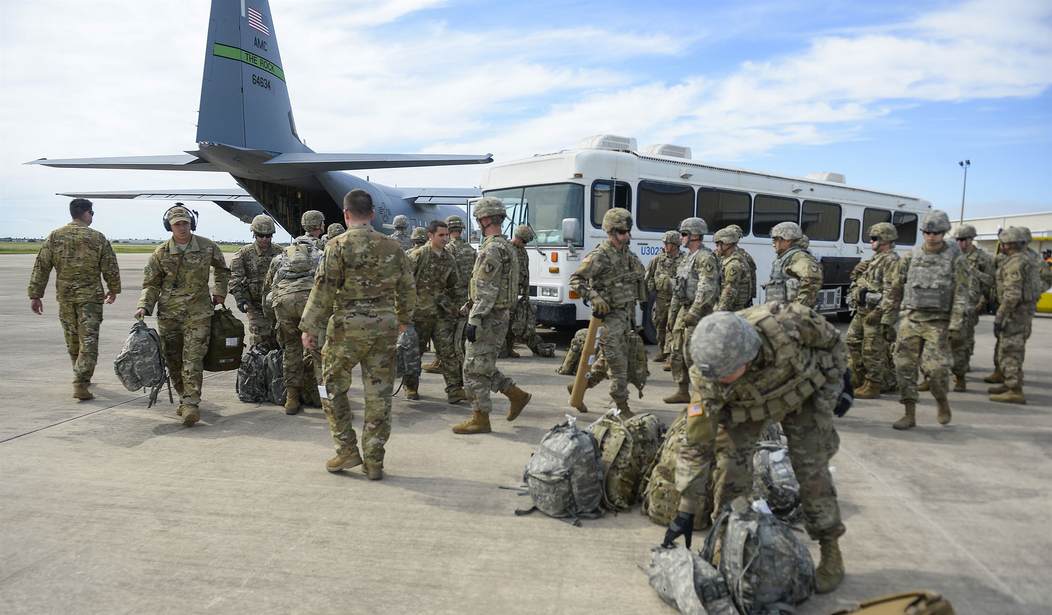Our country is broken -- it's coming apart at the seams -- and it is not going to fix itself. Repairing it will take effort from all of us. It may require consideration of some big national changes. Too many of us are just sitting back and watching America's decline. It's time to consider any idea that holds some promise for national renewal, any idea that could universally bring us all together and teach us a shared cause.
Perhaps even mandatory national service.
Mandatory service would require every 18-year-old to serve for a year or more. It is not a radical or new idea. Seventy-five countries have some form of national service requirement, and we've already required service at times in American history. It can also be broader than just military service. Other options include the Peace Corps, community service, cleaning up public lands and rebuilding aging infrastructure.
As a society, we are growing increasingly self-interested. Citizenship brings responsibility beyond self-interest. The concept of civic responsibility -- as enunciated so eloquently by President John Kennedy -- is eroding. A national service requirement can help reinvigorate a shared sense of citizenship in everyday Americans.
America is also becoming increasingly polarized and siloed along economic and racial lines. We no longer interact with those outside our own cohort. A rich kid growing up with parents in the New York City finance world likely has zero idea what it's like in an aging Ohio steel town. The kid in the steel town can't even imagine New York. They are two different worlds. Throw in racial division, and the whole thing is magnified. For a multiethnic, multiracial country with as many new immigrants as we have, this sort of polarization is deadly to national culture and unity. None of these dynamics is brand-new, but they are getting worse.
Recommended
The social and cultural segregation in our country is directly contributing to the coarseness of our national culture and politics. We no longer just disagree in America; we vilify those who don't share our views. Democrats think Republicans are Klansmen without the hoods. Republicans think Democrats are Joseph Stalin before the purges. Rural people think city people are snobby, materialistic and out of touch. Cosmopolitan urbanites think country people are stupid, fat and lazy.
When you have little interaction with those who don't share your background or beliefs, it's easy to view them as caricatures. It becomes easier to demonize or marginalize them. This results in the sort of fissures we have in America today and the normalization of summary political violence; we've all seen it. Left to fester, these dynamics lead to the downfall of societies.
We need to break down racial, class and geographic barriers to help create a stronger sense of national community. Doing that is not easy, but mandatory service can help rekindle a sense of civic pride and begin to erode some of the extreme polarization in America. A year's service requirement will bring together Americans from all walks of life, which will help young people understand one another. Contact reduces intolerance and promotes cohesion. And we are definitely short on national cohesion. We need it now more than we have at any time since at least the 1960s and maybe since the 1860s.
The main argument against mandatory national service comes from the military. America did have mandatory military conscription until 1973. Since then, we have had an all-volunteer force. Our professional voluntary military has served us well. Bringing in recruits who don't want to serve can cause problems with morale and discipline. We experienced this in Vietnam. We did, however, fight World War II with a system of mandatory conscripts based on registration and a lottery system. That seemed to work pretty well.
Mandatory service on the military side brings another benefit. Twenty years of fighting in the Middle East has contributed significantly to the erosion of support and trust in our national leaders. One reason may be that the brunt of the pain was endured by American working-class families. Working-class kids were enticed to join the military by ever-increasing bonuses and retention programs. This brought a sense in much of America that our leaders were out of touch and not feeling the pain that can come with extended military engagements. There are, of course, prominent exceptions to this -- including even the president's son, who served in the National Guard -- but as a general matter, it's true that wealthier citizens don't often serve in the military. Mandatory service would put an end to this dynamic.
The concept of a national service requirement is surprisingly popular nationally, considering nobody has been out making the case for it in a prominent way. In the 2020 election, Pete Buttigieg and John Delaney argued for some form of national service in the Democratic primary, but it was not a major talking point. Still, according to a Gallup poll in 2017, half of all Americans are in favor of a one-year mandatory national service requirement. Interestingly, the support is relatively bipartisan; 44% of Democrats and 57% of Republicans are in favor.
National service is complicated. It must be presented properly, or it could be a loser politically, and there are downsides we should explore fully. If you agree, however, that Americans are too self-absorbed and no longer as civic-minded, and especially if you think we are lacking in national cohesion, a national service requirement could be just the answer.
























Join the conversation as a VIP Member